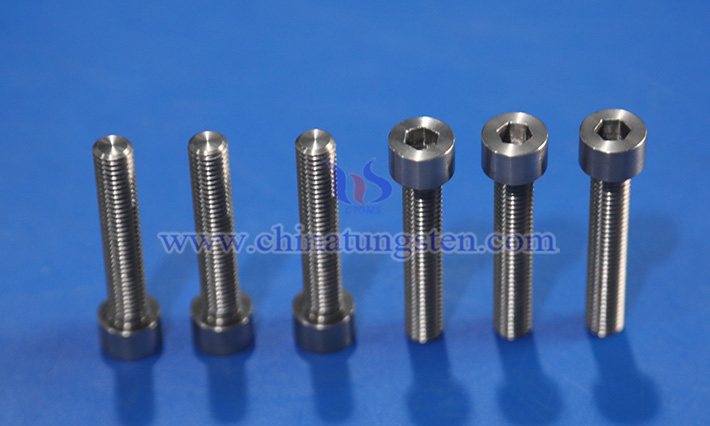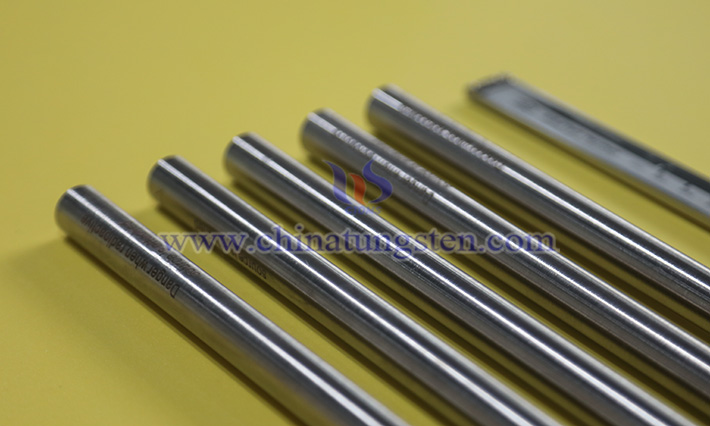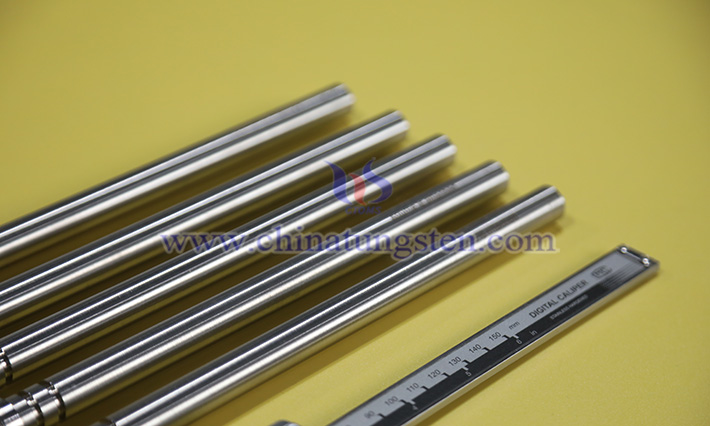What Are Tungsten Alloy Fasteners?
- Details
- Category: Tungsten Information
- Published on Wednesday, 17 September 2025 17:19
CTIA GROUP LTD tungsten alloy fasteners are mechanical connection components made primarily of tungsten, supplemented with elements such as nickel, iron, and copper, and produced using advanced processes like powder metallurgy. These fasteners, which include screws, bolts, nuts, and washers, are widely used in industries such as aerospace, nuclear power, marine engineering, electronics, medical devices, and military applications.

I. Characteristics of Tungsten Alloy Fasteners
Tungsten alloy fasteners have a density range of 16.5–18.5 g/cm³, significantly higher than carbon steel and stainless steel, endowing them with excellent counterweight capabilities and structural stability. For example, in aerospace equipment, high-density fasteners effectively resist vibration and impact, ensuring connection reliability. With a melting point of 3,422°C, tungsten is one of the highest-melting-point metals in nature, and tungsten alloy fasteners retain 70%–80% of their room-temperature strength at high temperatures, far surpassing ordinary steel. This makes them exceptional in high-temperature, high-pressure scenarios such as aviation engine combustion chambers or nuclear reactor pressure vessels.
Tungsten alloy fasteners exhibit high hardness combined with excellent wear resistance, enabling them to maintain surface integrity in high-friction environments over long periods. In contrast, traditional steel fasteners are prone to wear or fatigue failure under similar conditions. Additionally, their outstanding creep resistance allows them to maintain shape stability under sustained high-temperature loads, extending service life.
Tungsten alloy fasteners demonstrate remarkable chemical stability. Pure tungsten is highly stable chemically, showing minimal reaction to water, oxygen, and most acid or alkaline media at room temperature. The addition of nickel or copper as binder phases further optimizes grain boundary structures, enhancing resistance to electrochemical corrosion. Moreover, the high density of tungsten alloys provides excellent radiation shielding, effectively absorbing gamma rays and neutron radiation, making them widely used in nuclear industry applications such as reactor pressure vessel connections and radiation shielding component fastening.
The electrical and thermal properties of tungsten alloy fasteners further broaden their application scope. With low resistivity, they are suitable for connection components requiring conductivity, such as high-precision fasteners in electronic devices. Their high thermal conductivity allows rapid heat dissipation in high thermal load environments.

II. Types and Structures of Tungsten Alloy Fasteners
CTIA GROUP LTD tungsten alloy fasteners encompass various types to meet perse application needs. Screws are the primary form, including countersunk screws, pan head screws, and hex socket screws, suitable for different installation spaces and mechanical requirements. Bolts and nuts are commonly used for heavy-duty connections, such as in aviation engines or armored vehicle structural fastening. Washers are employed to distribute stress and enhance connection stability. Additionally, specially customized fasteners, such as slotted screws or irregular bolts, can be designed to meet specific demands.
The design of tungsten alloy fasteners emphasizes high precision and durability, meeting the stringent connection gap requirements in the aerospace field. Surface treatment is another key feature, with nickel plating, chrome plating, or ceramic coatings further enhancing wear and corrosion resistance.
The customizability of tungsten alloy fasteners is a significant advantage. By adjusting the alloy composition ratio, specific properties can be optimized—for instance, increasing tungsten content enhances density and high-temperature resistance, suitable for nuclear reactor applications, while increasing nickel content improves toughness, ideal for high-impact scenarios. The flexibility in size and shape also allows them to adapt to complex structures, such as miniature fasteners in spacecraftt docking mechanisms or large bolts in armored vehicles.

III. Application Fields of Tungsten Alloy Fasteners
In the aerospace sector, tungsten alloy fasteners are widely used due to their high-temperature resistance and strength. Aviation engine turbines and combustion chambers endure extreme temperatures and mechanical stress, and tungsten alloy bolts and screws effectively resist thermal creep and fatigue failure, ensuring long-term operational reliability. In spacecraft docking mechanisms, the low vapor pressure of tungsten alloy fasteners prevents material volatilization in vacuum environments, ensuring the normal operation of precision instruments. For example, in satellite attitude control systems, the low magnetic permeability design of tungsten alloy fasteners prevents interference with magnetic field navigation, significantly improving equipment precision.
The nuclear industry imposes high performance requirements on fasteners, making tungsten alloy fasteners an ideal choice. Their high density provides excellent radiation shielding, effectively blocking gamma rays and neutron radiation, and they are widely used for connections in nuclear reactor pressure vessels and the fastening of radiation shielding components. In the high-temperature, high-pressure reactor environment, the strength retention rate of tungsten alloy fasteners ensures connection stability, reducing the risk of leaks.
In electronics and medical fields, the miniaturized design and high performance of tungsten alloy fasteners offer unique advantages. In microelectronic devices, tungsten alloy screws serve both fastening and heat dissipation functions, utilizing their high thermal conductivity to prevent thermal failure in chips. In the medical sector, tungsten alloy fasteners are used in high-density connection components of X-ray tubes and CT equipment, with their high purity and biocompatibility ensuring imaging resolution and long-term safety.
In the military field, tungsten alloy fasteners are employed for critical connections in armored vehicles and weapon systems due to their high density and strength. For example, in the modular connections of composite armor, tungsten alloy bolts absorb kinetic energy from projectiles, enhancing protective performance. Their high-temperature resistance and impact resistance also make them suitable for fastening components in military launch devices. Additionally, the high hardness of tungsten alloy fasteners ensures wear resistance in high-stress environments, extending the service life of equipment.
- Chinatungsten Online: www.chinatungsten.com
- CTIA GROUP LTD: en.ctia.group
- Tungsten News & Price: www.ctia.com.cn
- Molybdenum News & Price: news.molybdenum.com.cn
- Tel.: 86 592 5129696; Email: sales@chinatungsten.com



 sales@chinatungsten.com
sales@chinatungsten.com